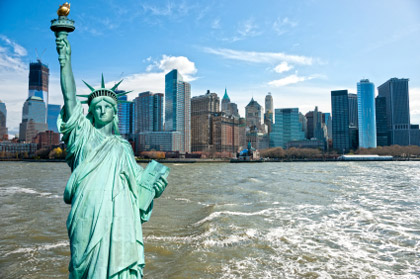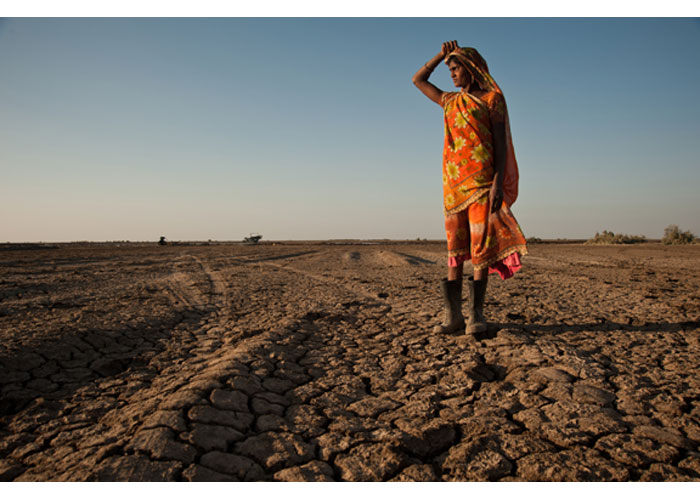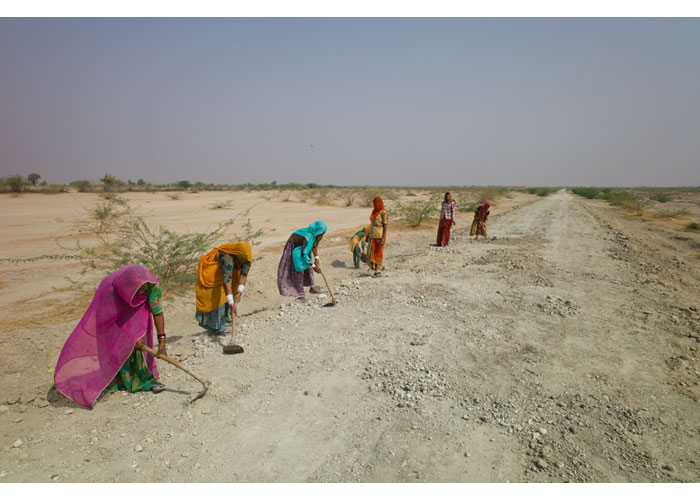Immigration and Unsustainable Growth
The United States is facing a future of too many people and too few resources, and its nation’s leaders fail to discern, or refuse to acknowledge, this reality. The one thing President Obama and Governor Romney both agree upon is the U.S. economy must grow as much as possible as fast as possible, and this growth is dependent upon rapidly increasing U.S. population though immigration. Where the two men disagree is how best to manage this growth – whether through the private sector or through centralized government planning. While these are fundamentally different economic philosophies, they both have the same goal, and both are divorced from the task that confronts Americans in the 21st Century.
 Despite the insistence by many politicians and corporate executives to the contrary, population growth and economic growth are not synonymous, and there is a distinction between economic growth and prosperity. There is no question that since its inception the United States has enjoyed both tremendous growth and economic prosperity, but the correlation between the two is misunderstood and thoroughly misrepresented by the many economists who insist all growth is good, and America can continue to grow forever. This precludes those who hold this view from dealing with the issue of sustainability. When solutions are offered by proponents of growth to the obvious problems of resource shortages, they usually offer the hope of “clean” technologies, “smart” growth or the colonization of Mars. It may be that humans will one day settle other planets, but people should not stake humanity’s existence here on Earth on that prospect.
Despite the insistence by many politicians and corporate executives to the contrary, population growth and economic growth are not synonymous, and there is a distinction between economic growth and prosperity. There is no question that since its inception the United States has enjoyed both tremendous growth and economic prosperity, but the correlation between the two is misunderstood and thoroughly misrepresented by the many economists who insist all growth is good, and America can continue to grow forever. This precludes those who hold this view from dealing with the issue of sustainability. When solutions are offered by proponents of growth to the obvious problems of resource shortages, they usually offer the hope of “clean” technologies, “smart” growth or the colonization of Mars. It may be that humans will one day settle other planets, but people should not stake humanity’s existence here on Earth on that prospect.
The reasoning behind pro-growth mania is that any and all economic activity leads to greater prosperity. Proponents of growth obsess over Gross Domestic Product (GDP), thus touting an increase in GDP as a sure sign the economy is on the right track. In reality, GDP is a totally inadequate measure of prosperity – at least shared prosperity. A rising GDP at best indicates certain sectors of the economy are thriving. But, it can also mean, as has been the case in recent years within the U.S., the increase in GDP has accrued to a very small minority – invariably those who argue a rising GDP means all is well on the economic front.
GDP is a crude measure of all economic activity, including government spending, which now accounts for about one-quarter of total U.S. GDP. GDP says nothing about income inequality, ecological degradation (How much is a tree worth, anyway?) or failing public schools. It does not highlight the fact that “job creation” does not mean fewer people unemployed or that these jobs may not pay a living wage. Take, for example, the outbreak of a violent riot and the resultant efforts to deal with it. There will be increased police and fire costs, medical bills and, perhaps, funeral expenses. Workers will clean-up and repair the damage and, in the process, maybe a few new jobs will be created. Insurance claims will be paid; ratings for local news stations may increase, causing a spike in advertising revenues; and store owners may spur a jump in consumer spending by offering lower prices to attract reluctant shoppers. All of this is included in GDP. Perhaps a person needs to be a Nobel laureate economist to believe an increase in economic activity following a riot is better than the absence of violence. However, most Americans place a higher value on peace and security.
The economic collapse in 2007 left many questioning the rudiments of America’s economic system, including no small number on the cusp of retirement who saw a good portion of their life savings evaporate within the span of a few months. When Senator John McCain said that “the fundamentals of our economy are strong,” he could not have been more wrong. America is still a long way from recognizing and correcting those fundamental flaws because too many think the country needs more of what brought it to this point in the first place – and all the nation needs to do is to better regulate Wall Street. There is general and righteous outrage because those who acted the most irresponsibly were the ones most richly rewarded with taxpayer monies. The poster child of greed and corruption, Goldman Sachs, had its most profitable year ever at the same time the U.S. economy was in its greatest free-fall since the Great Depression. While it is true the system has been unfairly tilted to favor a small number of greedy economic elite, Americans must not ignore that behind this lies a greater problem – a dependence on unsustainable growth tied to a rapidly increasing population driven by an immigration system out of control.
What Is America’s Immigration Policy?
When politicians talk about immigration policy they usually say two things: “America is a nation of immigrants,” and “The system is broken.” This is tautology, not a discussion of policy, and it does not in any way address what is fundamentally wrong with an immigration system that has no defined purpose and is directly at odds with the long-term interests of the vast majority of the American people. How can a nation reform an immigration system if it is understood in terms of platitudinous non-sequiturs. Yes, America is a nation of immigrants, but what does that mean in the 21st Century?
What it seems to mean to those who repeat the phrase as a mantra is that the citizens of the United States have no right to determine their nation’s immigration policy or to demand that its immigration laws be enforced. When listening to those who advocate “comprehensive immigration reform,” it seems the aim of the immigration system is the accommodation of foreign nationals and not the general welfare of the American people. To have a genuine discussion about U.S. immigration policy, stakeholders must understand the political and social history of the nation and recognize that its history, like every other nation’s, is unique.

© iStockphoto.com/MasterLu
Americans should not sanitize their history or allow it to become an impediment to a rational immigration policy today. Citizens cannot allow vague ideological conceptions to distract them from what is needed to achieve the difficult task of true immigration reform.
Americans have a tendency to romanticize their immigration history because it is the history of their forebearers, but this obscures the fact that assimilation has always been very difficult and made more so in times of mass immigration. Today, the U.S. admits more than one million legal immigrants every year in addition to hundreds of thousands of long-term guest workers. Adding to those numbers is illegal immigration, which has declined in recent years, but it is still high enough to offset the “record” number of deportations. The level of U.S. immigration today is an historical anomaly. The average annual admission to the United States, beginning in 1820 when immigration counts were first recorded, is only one-third of what it currently is. The so-called “Great Wave” of immigration during the Industrial Revolution was unprecedented, and it was in response to factory owners who pushed for cheap labor from Europe. America’s great industrialists did not heed Booker T. Washington’s plea to “cast down your bucket where you are.” Imagine how different American history would have been if, instead of enduring a century of segregation, newly freed slaves and their descendants could have leveraged their labor to exact good wages in Northern factories. The growth of labor unions and passage of labor laws protecting workers came as a response to the abuses of the late-19th Century. Today, the nation sees immigration levels, and the same mistreatment of workers, rising to the same level as during the Industrial Revolution despite the fact that Americans live in a post-industrial society and have little need for foreign labor.
American workers in all sectors are either increasingly having their wages suppressed or are being completely driven out of the labor market by an immigration system totally divorced from economic circumstances. America admits more than 90 percent of immigrants without regard to their education or skill level. The U.S. admitted the same number of immigrants when unemployment was at 9 percent as it did when it was at 4.5 percent. With unemployment now above 8 percent for the longest period in 70 years, the leaders of both parties are calling for massive increases in immigration and greatly expanded guest worker programs. And, many support granting amnesty to 10 million plus illegal aliens. Mass immigration drives population growth of about 3 million persons per year, and it corresponds with greater unemployment for American workers, increased income inequality and growing ranks of poor and uninsured. And, yes, it does help to raise GDP too.
Does Anyone Really Care About the Environment?
Most environmentalists have put on blinders to the issue of immigration and its relationship to population growth. The Sierra Club turned its back on the population issue after many years of touting it as the greatest threat to the U.S. environment. Its leaders now sidestep the issue by dismissing it as a global problem, thus ignoring their previous exhortations to “act locally” to effect change. William Baker, president of the Chesapeake Bay Foundation, disturbingly articulates the position of many influential “environmentalists:” “Would I like to see population stabilized, even reduced? Absolutely. But to tell poor countries to keep their people there because we don’t want their pollution is just wrong.”

© iStockphoto.com/DenisTangneyJr | Urban decay in Massachusetts.
What those like Baker disregard is that limits are necessary, and taking the easy way out is a sure path to ecological destruction. According to Baker’s logic, America would have to extend an invitation to all of the 1.4 billion people across the world now living in poverty to come to the United States. And, the country would have to keep admitting as many impoverished immigrants who wish to come until the United States collapsed under the weight because not to do so would be “wrong.” Yes, overpopulation is a global problem. However, no moral argument justifies making it more of a problem in the United States than it already is. There is no doubt the United States is already overpopulated because its occupants are consuming the nation’s national resources at an unsustainable rate. Americans are living beyond their means and are increasingly making things worse as U.S. population expands.
Any responsible discussion about the environment must acknowledge that population growth is as important a factor as per capita consumption when it comes to determining environmental impact. Population stabilization wasn’t always controversial. In fact, it was at the forefront of national debate. In 1972, the Presidential Commission on Population Growth and the American Future urged policies leading to population stability. It stated unequivocally that “the health of our country does not depend on [population growth] nor does the vitality of business nor the welfare of the average person.” Since that report was published, U.S. population has added more than 100 million residents – a 50 percent growth in 40 years. Two decades later, the U.S. Commission on Immigration Reform, known as the Jordan Commission in recognition of its chairwoman, the late Congresswoman Barbara Jordan, recommended immigration be curtailed and chain migration ended in order to better accord with the national interest. At the time, President Clinton promised to act upon the report’s recommendations. Neither Clinton nor any of his successors have done anything to address the reforms identified by the Jordan Commission.
Who at the national level today is discussing population growth as a public policy matter? Which candidate has identified the chronic water shortages across the United States as a problem that demands immediate attention? Does either party have a plank in its platform addressing the need to protect American workers by reducing employers’ access to foreign guest workers? President Obama’s agenda for change is dependent upon 3 percent annual growth in the GDP. Jeb Bush is touting a plan that he guarantees will grow the economy by 4 percent per year. Inherent in these promises of “recovery” is the promise of perpetual growth through mass immigration. Our leaders are peddling economic plans that rely on exponential population growth to continue forever. This thinking is nothing short of insane.
Recognizing Our Limits
The effort to achieve a stable and sustainable economy must enter the political mainstream if this nation is to survive. America is facing resource scarcity, massive ecological degradation, government insolvency and the systematic unemployment of tens of millions of people. That is not a recipe for national longevity. The U.S. is in this situation because its citizens have elected politicians who told them what they wanted to hear – that America would continue to be the richest, freest, most egalitarian, most secure nation in history if it only keeps growing.

© iStockphoto.com/sframephoto
What U.S. residents must confront today is the proposition that a genuine recovery and a sustainable economy cannot depend upon further population growth. The nation can no longer afford to have a debate about the economy that ignores the environment. America must begin by talking about population and recognizing that, by any measure, the United States is already overpopulated. The nation cannot continue to grow and continue to enjoy its current lifestyles.
The economic success of the United States owes much to initiative and innovation. It also owes much to good fortune and contingencies of history. This is not to demean free enterprise or the industriousness of Americans, past or present, but to acknowledge that prosperity and freedom are earned, they are not a birthright. The economy is not something that simply happens; it is the result of choices Americans make in response to the world around them. These choices are ultimately moral acts. Many of the material comforts U.S. residents take for granted today came about by the heedless consumption of fossil fuels – a rate of consumption that cannot continue.
Americans cannot have a serious conversation about the direction of the nation without addressing growth within the context of sustainability, and they cannot exclude immigration from that conversation. Not only is it legitimate to suggest a need to reduce immigration in order to achieve population stability, it is imperative to reduce immigration in order to do so. This does not mean ending immigration but instituting an immigration system that is environmentally sustainable and puts the economic interest of the American people first and foremost. Correcting course can only happen when opposition to rapid population growth overcomes the trite and petty nature of the nation’s current political “debates.” The effort to secure a sustainable future must begin with the affirmation that the American people have the absolute right to preserve themselves by defending the sovereignty of their own nation. They must reassert the principle that citizenship is an honor and a privilege, not something to be distributed as a cheap political favor. America is a country, not an economy, and the market is what Americans make it.




























